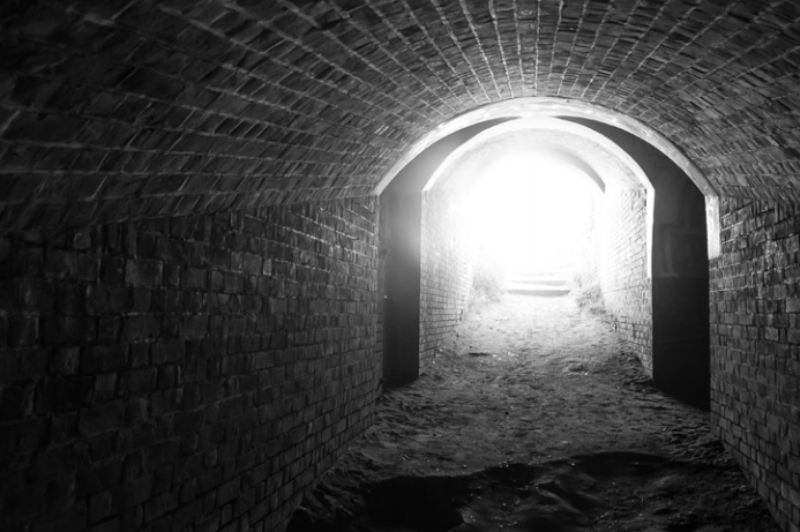Embracing liminality to meet God in an unfamiliar normal
An old way of doing things is slipping out of sight, but the new way has not yet come into focus. Simon Jones offers this reflection to guide our thinking

We emerge from lockdown blinking as if from a long tunnel, to be met by the strange new world that is totally familiar yet decidedly odd. Everything is where we left it, but it seems to fit together differently.
Sociologists trying to describe such situations reach for the term liminality, coined in the world of anthropology at the turn of the 20th century to describe the transition from boyhood to manhood among certain tribal groups. The language was brought into modern missional thinking by Alan Roxburgh and others as they wrestled to describe how we engage with a culture that drifted far beyond the church while we weren’t paying attention.
Liminality describes that feeling that we are betwixt and between; an old way of doing things is slipping out of sight but the new way has not yet come into focus and so we struggle to find our bearings. I suspect that this describes how many of us feel emerging from the lockdown. We want old familiar ways of relating and patterns of living to return. But we’re not sure we want everything that was the norm prior to the pandemic - poverty, rising food bank use, homelessness, the exhaustion of the daily commute, the endless round of consumption, the wretched quality of the air we all breathed, disregard of climate change.
Being in a liminal place is tough but it is not simply something bad we struggle to get through, it’s an opportunity for us to seize to grow through. So, is the liminality of not being able to meet pointing to the opportunity to meet in different more rewarding ways? Is the liminality of not being able to preach to a live audience leading to the opportunity to create more dialogical forms of communication? Is the liminality of the large group, everyone-all-together normality not returning leading to the opportunity of small, multi-voiced gatherings round kitchen tables? Is the liminality of not breaking bread together leading to the opportunity of sharing food with our neighbours in new expressions of mission and life?
Let’s unpack this a bit. I think these thoughts, beginning at home and radiating out to our neighbourhood and the public square, could shape our post-Covid normal.
I think that too often we have had a ‘we’ve got the answer, now what’s your question…’ attitude. We don’t spend enough time listening. What are our neighbours talking about when they gather in the park, what is the conversation on the radio and TV, what are our hearts saying?
The cultural critic and activist John Berger, asked what we should do in the face of the refugee crisis in 2015, responded, ‘I have been thinking about the storytellers’ responsibility to be hospitable.’ This quote shaped how I understood the work in which I’ve been involved in Calais and London with refugees since then. I do not have ‘an answer’ but I do have the ears to listen and a tongue to share the stories I am hearing as hospitably as I can. It seems to me that this is where dialogue for change springs from.
Everyone has a story, especially since lockdown; lives are shaped by such narratives, articulated and unspoken. Activist George Monbiot in his book, Out of the Wreckage, suggests ‘You cannot take away someone’s story without giving them a new one.’ Change only happens when you replace an old story with a better one. This is true in politics but it’s also true in an individual’s life.
The narratives of our lives are shaped by the gospel and our engagement with the world. As we listen we become hospitable storytellers, drawing people into the story God is telling about creation and where it’s headed, helping them to make sense of the past months and see a more hopeful future.
We should be looking to create networks of outrage and hope. But we can’t create communities that live as a challenge to injustice and inequality if we are only discipling people into an individualised spirituality focused on me and my salvation. This only embeds a privileged, exceptionalism in us and our people - ‘we’re ok, you’re not; you need our answer but you can only have it if you become like us’.
So the missional challenge begins in how we disciple people. Only then does it shape what we say: is our message that we have life taped and sorted and people should come and join us to sort out their lives? If so, we risk being very unattractive to those struggling to make sense of what is happening to them and their family, especially in the light of the pandemic.
If, however, our message is that we are struggling to make sense of things and we find that Jesus is helping us, it might mean that what we say and how we say it draws people to our kitchen tables. It removes the barrier that we sometimes erect that we have worked life out but others haven’t. This is weeping with those who weep, offering lament in a world that doesn’t how to; maybe even using lament to connect with those in our street/block/close, helping them to find the words they can’t find for themselves because one thing is certain, we are emerging into a post-lockdown world shot through with grief.
Coupled with this, we often see mission in terms of well-resourced and planned events and activities. But I wonder if we need to recapture the missional spirituality of small acts of kindness and grace, simple acts that we can all do that might change or even save a life.
Further, we have always seen mission as something we do, we initiate, inviting people on to our turf where we are the hosts and everyone else are our guests, and so we set the terms of engagement - always in our favour. But through lockdown, we have seen groups in our communities doing what we used to think was our prerogative - feeding people, shopping for people, befriending the lonely and isolated - and often doing it better, more inclusively and effectively than us. As lockdown ends, will we join them or insist on returning to our own me-too projects?
Many are finding that getting involved in community organising through Citizens UK is opening up their neighbourhoods in ways their own mission initiatives never did. There is a sense in which the Christian faith may have catalysed a concern to do good in society (not least Citizens UK itself), an attitude that is now embedded in the culture - for example the NHS. So do we now join local initiatives to ensure that the values that led to them arising in the first place are maintained?
In uncertain times, are we mobile enough to go where God leads in mission? Alan Roxburgh suggested that Luke 10 is a great call to mission for our times, with its focus on going, accepting hospitality, working alongside others, sharing meals and exchanging stories.
How might all this shape the way we think about mission in our neighbourhoods as we emerge from lockdown?
 Simon Jones is vice principal of Spurgeon’s College, and co-founder of Peaceful Borders which works alongside refugees in Calais and London
Simon Jones is vice principal of Spurgeon’s College, and co-founder of Peaceful Borders which works alongside refugees in Calais and London
This article appears in the autumn 2020 edition of Baptists Together magazine
Listen to Simon speak about this article here
Do you have a view? Share your thoughts via our letters' page.